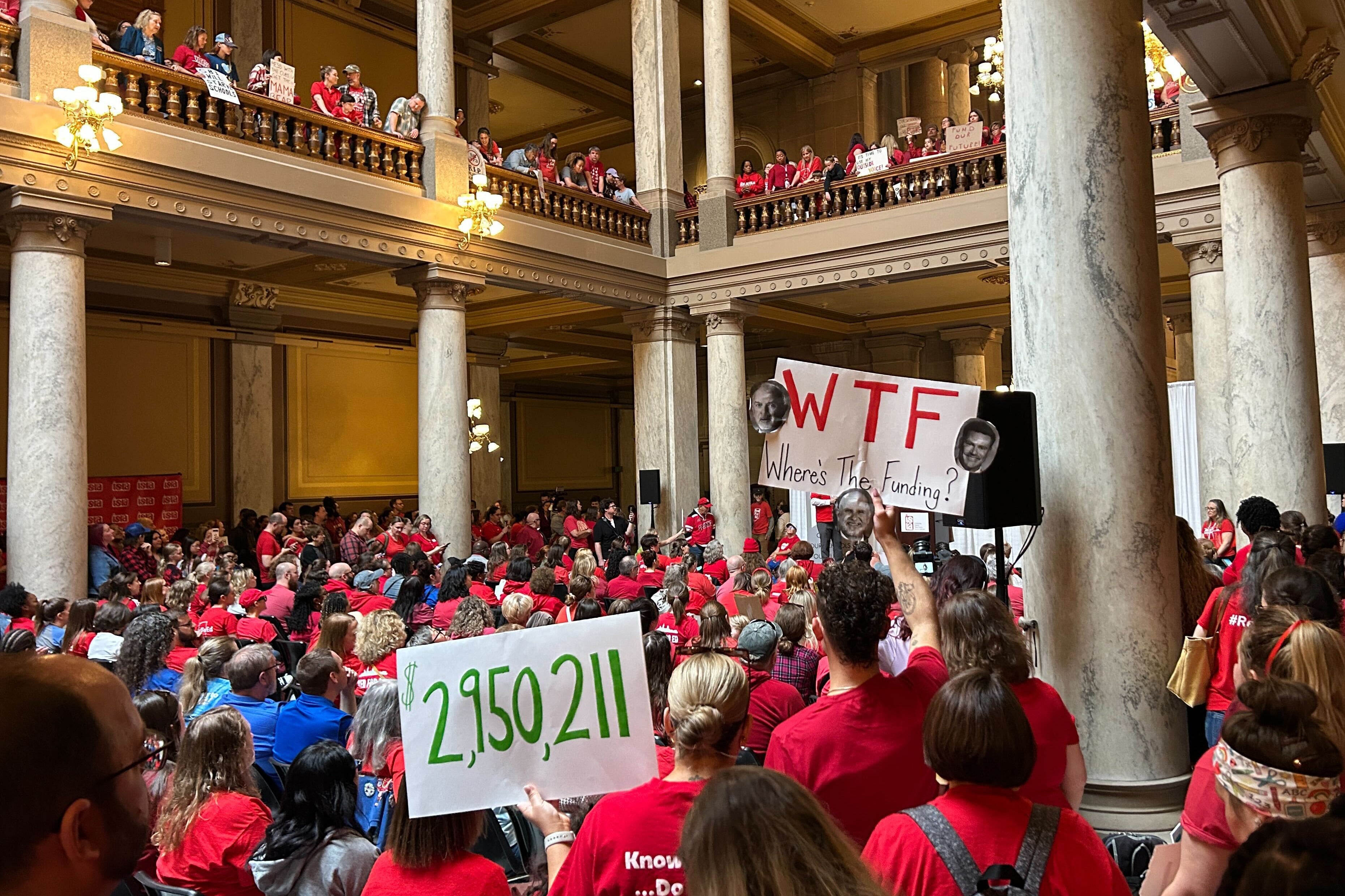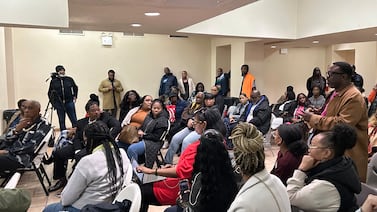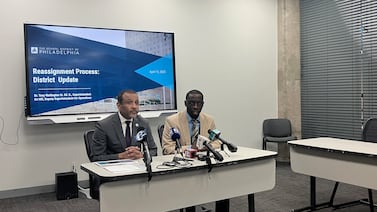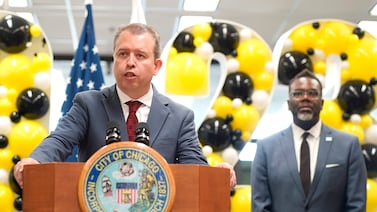Hundreds of Indiana teachers rallied at the statehouse Monday to protest a property tax reform bill that would cost the state’s school districts an estimated $744 million over the next three years.
The planned rally — part of the Indiana State Teachers Association’s day of action — came in the final days of a legislative session, which features several bills that could significantly alter the future of the state’s public education system.
Perhaps the most significant legislation is Senate Bill 1, which focuses on property tax reform. The bill has been criticized by school districts and other public entities concerned with the impact that it would have on their budgets. The latest version of the bill would offer a maximum $300 tax credit for homeowners and other deductions, while also giving local governments the option to raise local income taxes to offset the loss in property tax revenues.
After over eight hours of session, senators narrowly voted around midnight to agree with the changes to the property tax proposal made by their House counterparts. That means the bill will now make its way to the desk of Gov. Mike Braun, who has expressed support for it. Lt. Gov. Micah Beckwith, meanwhile, called for the governor to veto the bill in a social media post over the weekend.
In an exchange, Democratic Sen. Fady Qaddoura pointed out that schools would lose over $700 million in property tax revenue compared to current state law. But Republican Sen. Travis Holdman said schools would still gain property tax revenue year over year under the changes brought by the bill, but that the revenue would grow at a slower rate than under current law.
Sen. Andrea Hunley also asked for more clarity on how the changes in the bill would impact schools beyond the fiscal projections that extend to 2028.
The Senate spent much of its time Monday discussing its version of the state budget, which does not include universal vouchers or equal state funding for virtual schools — two provisions of the House version of the budget. Though Democratic senators proposed several dozen amendments, the education funding proposals remained largely unchanged from the version lawmakers introduced last week.
The budget will return for a final reading and vote in the Senate Tuesday. But a conference committee will likely need to hash out the differences between the two chambers’ versions of the funding proposals.
At the rally, teachers and union members at the rally also voiced concern with other legislative efforts, including the dissolution of the Union School Corporation and a requirement to share property tax revenues with charter schools in SB 1.
They also decried two amendments to Senate Bill 373, which House lawmakers discussed Monday. One amendment would create a mastery-based education pilot that they say would skirt collective bargaining rights. The other would establish the Indianapolis Local Education Alliance, which would examine how Indianapolis Public Schools and charters within its boundaries could share resources.
“The way it is currently, education — public education as we know it — will begin to disappear,” said Jenny Noble-Kuchera, president of the Monroe County Education Association. “And our children are the victims.”
SB 373 will be eligible for a third reading and vote ahead of the deadline for bills to clear their opposite chambers on Tuesday.
The rally caused at least four school districts to close or offer asynchronous learning days for students due to the high number of teachers that announced they would not show up for school Monday.
‘You’re advocating for the future of learning’
Educators with Indianapolis Public Schools and Monroe County Community School Corporation — both of which announced asynchronous learning days for Monday — worried about the impact of property tax reform and the requirement to share revenues with charter schools.
Under SB 1, IPS would lose roughly $14 million over the next three years. IPS has estimated it would lose $96 million through 2032. Those figures include the impact of proposed revenue sharing with charter schools, which would begin in 2028 and would grow to the full required amount in 2032.
Monroe County schools would lose roughly $17 million in the next three years under the bill.
Mary Garner, an English teacher at Shortridge High School in Indianapolis, said IPS already does more with less. She noted that the district doesn’t receive the state funding for students who leave a charter school and come back to IPS after the state-designated count day.
“We’re going to do that on even less,” Garner said. “And at some point that system’s going to break.”
In a statement, Kim Reier of the Indiana Charter Innovation Center — a new group that advocates for charters statewide — said that all public school students deserve fair funding.
“Ensuring public charter schools have access to local operational funding helps fulfill Indiana’s long-held promise for public school choice and honors the decisions of the 56,000 public school parents and students who are choosing public charter schools,” Reier said.
In her speech to the crowd at the rally, Indianapolis Education Association Vice President Monica Shellhamer lamented the lack of teacher representation on the proposed Indianapolis Local Education Alliance. And her support for the Union School Corporation drew strong cheers from the crowd.
“We cannot stand by and let the legislature decide what schools should be open and what districts should be closed,” Shellhamer said.
Meanwhile, Rep. J.D. Prescott, the Union City Republican who offered the amendment to dissolve Union School Corporation, cited Union’s declining enrollment and poor reading test scores to justify his proposal.
But Union Superintendent Galen Mast said the district’s IREAD pass rate — which was 44% in 2024 — accounts for both in-person and virtual students. The pass rate just for students at its brick-and-mortar Union Elementary School, he noted, is much higher. The 2024 pass rate for that school was 75%.
“It’s not democracy,” he said of the attempt to dissolve the Union district. “It’s authoritarianism.”
Meanwhile, other educators outside of IPS and Union also worried about what the legislation would mean for their own school district’s future.
“We know everything that’s happening to IPS is headed our way out in the suburbs,” said Rita Maxey, a teacher at Lincoln Middle School in Pike Township, where residents have strongly opposed the expansion of charters. “It’s only a matter of time.”
Ahead of the rally, Republican Rep. Andrew Ireland of Indianapolis filed an amendment to Senate Bill 373 that would forbid school districts from converting scheduled instructional days to virtual instructional days because of a “planned or coordinated absence of teachers” due to a protest or political advocacy event.
Ireland withdrew his amendment but said he would bring it back next year.
But Lyra Palmer, a fourth grader at Butler Lab School 55 in IPS, was happy to join her younger sister Fiona in advocating for public school funding at Monday’s rally.
“This is an amazing use of a school day,” Lyra said. “Instead of going to school and of course learning, which is important, you’re advocating for the future of learning.”
Amelia Pak-Harvey covers Indianapolis and Lawrence Township schools for Chalkbeat Indiana. Contact Amelia at apak-harvey@chalkbeat.org.
Aleksandra Appleton covers Indiana education policy and writes about K-12 schools across the state. Contact her at aappleton@chalkbeat.org.







